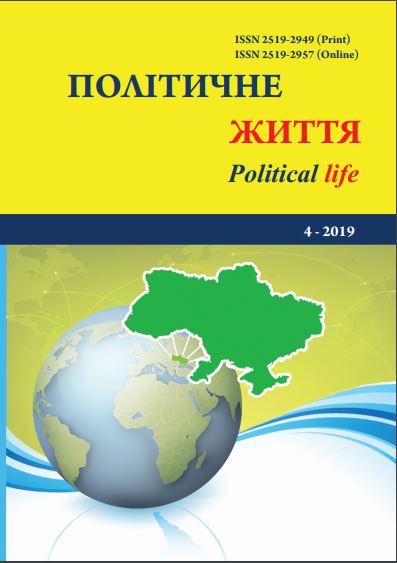Modern geopolitical concepts: conclusions for Ukraine.
DOI:
https://doi.org/10.31558/2519-2949.2019.4.15Keywords:
geopolitics, geopolitical concepts, geostrategyAbstract
The purpose of this paper is to analyze current geopolitical concepts and determine their significance for Ukraine.
It is emphasized that the correct realization of the achievements of geopolitics as one of the leading sciences of the twenty-first century enables the states to choose their foreign policy of development, to protect national interests and to develop in the international arena. At the same time, it is emphasized that modern geopolitics is a complex complex of sometimes ambiguous and controversial projects and projects. Often geopolitical concepts contribute to the functioning of superpowers. Therefore, it is important to adequately analyze current geopolitical concepts and determine the possibility of adopting their ideas for specific use. It is emphasized that the relevance of this study is substantiated by the need to update and make more effective Ukraine’s geopolitical strategy using existing scientific achievements and modernization potential of the state.
Such geopolitical concepts as the concepts of convergence, neo-mondialism, neo-Eurasianism, the concept of the «horizon line» by J. Attali, the futurological concept of C. Santoro catastrophes, the idea of Orientalism of Said are analyzed. Their specific features are defined. The concept of geoeconomics and the outlined geoeconomic spatial approach of J. Attali are considered, in particular, possible geoeconomic spaces in the world. Likely possible scenarios of catastrophes by K. Santoro.
It was noted that both in the concept of Mondialism and in the concept of Eurasianism, Ukraine was given the role not of an independent actor, but of a bridgehead for imperial ambitions. Futuristic ideas are effective in predicting particular geopolitical processes and can be used to refresh a geopolitical strategy, and can be used by orientalist scholars and statesmen and politicians to gain a deeper understanding of different cultures in international relations.
It is concluded that the main directions of development of modern geopolitical concepts are: globalization dimension, interconnection between all states of the world, development of market relations and liberalism, increase of the number of local wars, redistribution of geopolitical points of influence, reformation of international organizations. It is emphasized that one of the main aspects in this context is the enhancement of the power of the Pacific States and certain Eastern countries. The geopolitical role of countries in the African continent remains ambiguous. It is determined that it is important for the Ukrainian state to position itself as a strong «middle» state; to develop information technologies; establish more effective partnerships with countries in Asia, Africa and the East; even more actively participate in international events and become a member of international organizations; create its geopolitical concept and strategy; definitively determine geopolitical identity. It is emphasized that the prospects for further research are the study of other modern geopolitical concepts, as well as the analysis and forecasting of the geopolitical picture of the world and changes in the location of the centers of power and the role of Ukraine in them.
References
Геффернен М. Значення Європи. Географія та геополітика / М. Геффернен / [Пер. з англ.]. – К. : Дух і літера, 2011. – 464 с.
Гумилёв Л. Passionarium. Теория пассионарности и этногенеза. Этногенез и биосфера земли. Конец и вновь начало // Лев Николаевич Гумилёв. – М. : АСТ, 2016. – 936 с.
Дашевська О. В. Геополітичний статус держави: сутність, фактори та функції / О. В. Дашевська // Грані. – 2015. – № 9 (125). – С. 33–37.
Русанова М. Класична геополітика як наука, що сприяє створенню імперій: критичний зсув у дослідницький парадигмі геополітики / Марина Русанова // Гілея : науковий вісник. Збірник наукових праць. – 2013. – Вип. 74. – С. 400–402.
Ставицький А. Вплив сучасних геополітичних викликів на економічну безпеку держави / А. Ставицький // Вісник Київського національного університету імені Тараса Шевченка. – 2018. – № 4 (199). – С. 45–55.
Сучасні геополітичні теорії та школи [Електронний ресурс]. – Режим доступу : http://studies.in.ua/ru/geopolitika-seminary/1287-suchasn-geopoltichn-teoryi-ta-shkoli.html
Фукуяма, Ф. Конец истории и последний человек / Фрэнсис Фукуяма ; [Пер. с англ. М. Б. Левина]. – М. : АСТ, 2007. – 588 с.
Саїд В. Е. Орієнталізм / Едвард В. Саїд / [Пер. В. Шовкун). – К. : Основи, 2001. – 511 с.
Хитрич Г. Едвард Саїд, «Орієнталізм». Короткий аналіз першоджерела / Ганна Хитрич // Cultura Libera. – 2013. – 8 квітня [Електронний ресурс]. – Режим доступу : http://anculture.blogspot.com/2013/04/blog-post_6742.html
Attali J. Millennium: winners and losers in the coming world order / Jacques Attali. – New York : Random House, 1991. – 132 c.
The Global Risks Report 2018 13th Edition [Електронний ресурс] – Режим доступу : http://www3.weforum.org/docs/WEF_GRR18_Report.pdf 17

